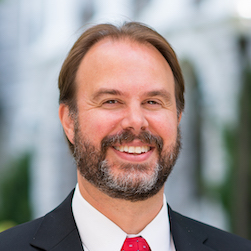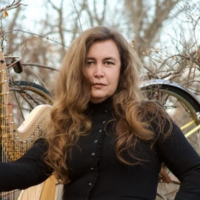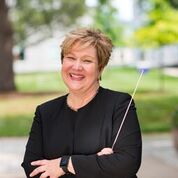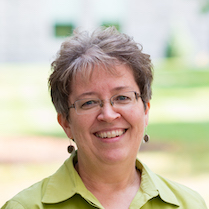
JMU offers an undergraduate Music Education concentration, a jazz subtrack for the Music Education concentration, and a graduate Music Education concentration. You can see required audition/application materials for the music education concentrations.
The Concentration in Music Education is the largest program in the School of Music at JMU. The degree program is designed primarily for those seeking to teach instrumental, vocal, or general music in preK-12 school. It is a state-approved licensure program that usually transfers well to other states. Graduates of the program are sought after for teaching positions in the state and throughout the Atlantic coastal region. They also pursue graduate study at highly regarded institutions and music education opportunities outside of K-12 teaching.
A core belief of the program is that excellent teachers must be excellent musicians. The School of Music has a strong reputation for nurturing this excellence in all its programs. The Music Education program enjoys the support of an outstanding College of Education and a heritage of teacher preparation that dates from the beginning of the University. The music education curriculum is comprehensive and includes field experience in music classes and other music education settings throughout the program. We encourage undergraduate students to conduct original research; students have received research grants and presented their work at state and regional conferences. We offer an innovative approach to teaching students with special needs that runs throughout the curriculum, and we embrace the place of technology in 21st century teaching.
For questions or more information on Music Education at JMU, please contact Dr. William Dabback at dabbacwm@jmu.edu.
Helpful Links
- Music Education Application Information
- Music Education Concentration Undergraduate Curriculum
- Music Education Concentration Graduate Curriculum
- School of Music Undergraduate Student Handbook
- School of Music Graduate Student Handbook
- VMEA School of Music Awards
- JMU Kodály Teacher Training
- JMU Music Education Instructors & Professors
Music Education at JMU (Undergraduate)
All undergraduate Bachelor of Music applicants must audition on a major instrument or voice part. This includes music education. Please refer to the audition requirements for your instrument or voice.
Initial considerations for students include:
- Freshman Year: Interested students should declare to their advisor they wish to pursue the Concentration in Music Education when they enter the School of Music or as soon as possible. This declaration will facilitate academic advisement (including enrollment in MUS 150) and receipt of proper information.
- Sophomore Year: Students considering the Bachelor of Music with a Concentration in Music Education should take MUED 271 (Music Education: A Professional Choice) in the fall semester of their sophomore year. They should take MUED 273 (Music Education: Professional Practice) in the spring semester of their sophomore year. These courses are a prerequisite to the other methods courses in Music Education.
Summary & Timelines
The typical summary and timeline of music education assessment gates is as follows:
|
Freshman Year |
Fall/Spring |
Declare a concentration in Music Education Take Praxis Core Take GWRTC 103, a math course, and MUS 150 |
|
Sophomore Year |
Fall/Spring |
Take MUED 271 & apply to the Teacher Education Program (fall only) Take GPSYC 160 (fall or spring) |
|
Spring |
Take MUED 273 (spring only) |
|
|
Junior Year |
Fall |
Apply to student teach the following school year (apply in the fall to student teach in either the fall or spring of the following year) |
|
Semester before Student Teaching |
Consider taking the VCLA and Praxis II (0113) Submit Pre-Student Teaching Portfolio |
|
|
Senior Year |
Semester of Student Teaching |
Pass VCLA and Praxis II (0113) |
|
Following Completion of Program |
Apply for licensure |
**Students may appeal decisions of the Coordinator of Music Education to the Music Education Committee, then to the Director of the School of Music, and then to the Dean of the College of Visual and Performing Arts.
Music Education at JMU (Graduate)
Through their enrollment in our program of study, Music Education graduate students will develop a fluency in a variety of areas of scholarly musical endeavor that reflect the JMU Music Education Values:
- Contextual Sensitivity: careful enacting of responsive pedagogy through processes of reflection, iteration, diversity, and inclusion.
- Hybridity: purposeful interweaving of established and emergent music making and learning through use of acoustic, analog, and digital technologies.
- Entrepreneurship: playful developing of diverse music learning experiences through identifying, designing, and bringing a vision to life under conditions of risk and uncertainty.
- Creative praxis: meaningful integration of contextual sensitivity, hybridity, and entrepreneurship in designing, facilitating, and sustaining music making and music learning.
The courses in each Master of Music degree concentration are to be distributed among courses in the major area, cognate courses in music, approved electives, and a significant major project. The music education capstone project involves registering in both MUED 680 and MUED 700.
Click here for more information on the Master of Music application & requirements.

Amy Birdsong
Director of Recruitment; Music Education Area Coordinator; Lecturer

William Dabback
Professor; Director of Graduate Studies and Admissions

Rachel Grimsby
Assistant Professor

Bryce Hayes
Professor; Associate Director of Choral Activities

Annie Savage
Assistant Professor

Jo-Anne van der Vat-Chromy
Professor of Choirs, Conducting, and Music Education; Director of Choral Activities

Scott Zane Smith
Instructor; Class Piano Coordinator, Supervisor, & Instructor

Rhonda Stees
Instructor

Laura Mulligan Thomas
Instructor, String Music Education

